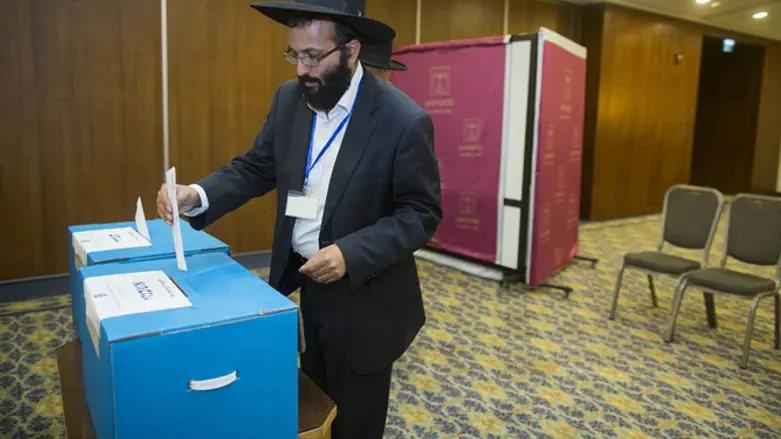
The Religious Services Ministry has removed Judea and Samaria residents from the list of members of the Assembly that elects the Chief Rabbinate Council, the Walla website reported today.
This is a body of 150 members and chooses 10 of the 16 members of the Chief Rabbinate Council, five of them Ashkenazim and five Sephardim, for a term of five years.
Council members convene for monthly meetings where they decide on halachic issues with significant implications for the country's citizens, including kashrut, conversion, rabbinical certificates, Shabbat, and more.
At an Elections Committee meeting, a Religious Services Ministry Legal Bureau representative stated residents of Judea and Samaria had been removed from the body, "so," as he puts it, "we only refer to 'little Israel'."
Some committee members objected to the move. They were led by Committee Chairman Rabbi David Levanon, who said at the meeting: "The Chief Rabbinate determines its instructions in kashrut and other related religious matters also for Judea and Samaria. There's no reason to deny them the possibility of participating in these elections." Another committee member, Rachel Dotan, argued "anyone entitled to vote for the Israeli Knesset should be entitled to vote here, too." At the meeting's end the committee members decided to request an additional legal opinion on the subject.
In response to the report, MK Betzalel Smotrich (Jewish Home) said: "It's chutzpah that such a subject even arises after fifty years of magnificent settlement. Israeli citizens, residents of Judea and Samaria, aren't fourth class citizens and can't be discriminated against on the background of their place of residence. In the coming days I'll turn to the Prime Minister and the ministers in charge - the Religious Affairs Minister, the Defense Minister, and the Justice Minister, demanding immediate implementation of the necessary amendments to the law so residents of Judea and Samaria won't be excluded from the selection process and to postpone elections to the Chief Rabbinate Council until then. This is an absurdity that cannot be accepted and I've no doubt it will be corrected."
Gush Etzion Regional Council head Shlomo Ne'eman said in response to the decision, "This is a scandalous decision that excludes residents of Judea and Samaria from the public arena, a dangerous precedent that must be cancelled immediately. We're not second-class citizens and we'll fight that this decision not be implemented. I expect the Chief Rabbinate's electorate to refuse to convene discussions from this moment until the matter is settled. There's no logic here and no thought. If the Israeli government has no legal means of granting equal rights to residents of Judea and Samaria, this fact attests like one thousand witnesses that the time has come to apply Israeli law in Judea and Samaria - and the sooner the better."
The National Union party said, "It's unthinkable that a government ministry is excluding residents of the State of Israel. Religious services in Israel belong to Israel as a whole (klall Yisrael) and not to a certain part of the population. Such politics mustn't exist in Religious Services or any other government ministry. We call upon the Religious Services Ministry to relent and for the Chief Rabbinate Council not to accept their recommendation. The days of dividing lines in Israel has ended. The citizens of Israel are equal within all borders of our country."
Agriculture Minister Uri Ariel (National Union) said in response, "This is an unprecedented scandal. The citizens of Judea and Samaria are regular citizens; their exclusion from the election of members of the Chief Rabbinate Council is out of the question. I'll work to abolish exclusion of Judea and Samaria residents, and I'm certain the Justice Minister and the Defense Minister won't allow this sad reality to occur."